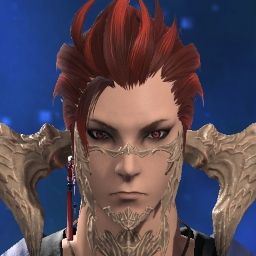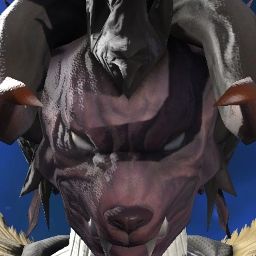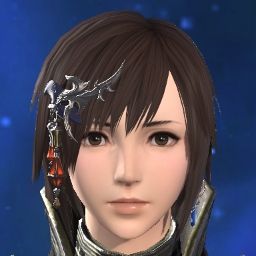Personally I still think the Sundering was straight up genocide. It makes zero sense for the different races all to evolve exactly the same on all the shards. For there to not even be a whiff of legend about the ancients unless the sundering actually killed them all and all venat did was put their torn apart souls into creation concepts. Which is also why she calls us "Her Children" and why in the final days2 it was people who were corrupted rather then the ancients creations. Essentially while aetheric density does make it harder, the reason people were corrupted so easily was simply due to the fact that they are the descendents of beings given form with creation magic. As to why the races are so different. Venat just used the existing concepts. I know YP has pretty much ruled this out. But its what i think makes the most sense.
I also think Venats "fly my childrenand never look back" in the moon ship plan was doomed to fail from the start. The moment that ship left the fading protection of Zodiarks influence, they would all have started turning, trapped like rats with no escape.
I still think Zodiark was done dirty i never wanted him to become the big bad we had to fight. But i do think it would have been a nice twist to actually release and speak to the god and learn it was as emet had always said, a saviour. (It kinda still is this but its so poorly done that its often lost due to the other stuff happening)
-
04-04-2022 06:10 PM #3171Player

- Join Date
- Nov 2016
- Posts
- 359
- Character
- Rihan Nurarihyon
- World
- Phoenix
- Main Class
- Black Mage Lv 100
(13)
-
04-04-2022 06:17 PM #3172(8)
-
04-04-2022 06:23 PM #3173
I'm hoping Myths of the Realm actually sheds some light on the vague state of the world immediately post-Sundering with the mention of it being like "an epilogue to the Hydaelyn and Zodiark conflict", but I have doubts it's going to make the reasoning/logic behind the Sundering any easier of a pill to swallow.
There really was no indication Meteion wouldn't have simply dogged the people of Etheriys wherever they fled and considering how poorly the Hannish folk responded to skies going ablaze again at Garlemald after they had already experienced it prior, I'd imagine yet another Final Days befalling whatever star they may have managed to resettle probably would've led to the remainder being completely consumed by despair.(9)Last edited by KageTokage; 04-04-2022 at 06:35 PM.
-
04-04-2022 06:27 PM #3174
I think it's pretty good for that "subverting expectations" thing at least. You got a being with a demonic, monstrous appearance, and he's a hero who saved the world and everyone on it. You also got the angelic being with an appearance of purity and beauty, and she's a narcissistic megalomaniac who destroyed the world and killed everyone on it.
(12)
-
04-04-2022 07:51 PM #3175
-
04-04-2022 09:16 PM #3176Player

- Join Date
- Mar 2011
- Location
- Gridania
- Posts
- 2,327
- Character
- Colino Nyea
- World
- Omega
- Main Class
- Culinarian Lv 90
Zodiark more like Zodi-fart amirite
(1)
-
04-04-2022 11:31 PM #3177Player

- Join Date
- Mar 2022
- Posts
- 655
- Character
- Victoria Crowny
- World
- Hyperion
- Main Class
- Black Mage Lv 90
The existence of Ardbert (and his party), Grenoldt and Mowen on the first is meant to imply that everyone and everything on each shard split identically across all the shards. This is, of course, somewhat muddled by the fact that our WOL can be anything we want, but the Warriors were all identical reflections of the Derplander's squad, Grenoldt is just Gerolt with hair, and Mowen is just straight up Rowena with one letter missing and one changed. Of course, this bears the question of free will and why and how there's been no variation on interbreeding and intermixing over the past 12,000 years. Did every person marry/have children with the exact reflections of their spouses on other worlds? Have there been no other stories like Lamitt falling in love with Ardbert? Have there been no other mixed children like Hilda? Or do genes eventually "settle" on one species, like with G'raha?
Playing devil's advocate here, but I think the implication was that the Song of Oblivion spreads from star to star. We're never told how much time passed between Meteion's escape from Elpis, but it was at least months or years. It's also likely that the Loporritz had scouted stars that were unlikely to have been affected by the Song yet, although they make it clear several times that they actually have no idea what's on them or what they're like.
The goal of the Moon plan was simply to outrun the Song for as long as possible. In the face of death, sometimes all you can do is struggle to live just one more day and hope that maybe one day, someone will find a way out of this.(7)Last edited by CrownySuccubus; 04-04-2022 at 11:52 PM.
-
04-05-2022 01:32 AM #3178
okay, I never had a say in whether what hydaelyn did was genocide or not because I wasn't sure if the Ancients were killed or not. So I just stayed out of it. My dum dum brain thought that's all it was, killing people. Then someone kindly dropped the definition for the word and, did anyone actually read the site?
https://www.un.org/en/genocideprevention/genocide.shtml
I mean, actually read the whole thing? What Hydaelyn did that was deliberate and conscious of the outcome because of time travel was: 1. Changing the physical makeup of a group of people and removing their capabilities to deal with their environment (soul sundering, loss of creation magic), and 2. Removing the majority of their memories and identity and erase them from history (so they are not tempted to find a paradise again).
So, look at the definition again:
Article II of the Genocide Convention contains a narrow definition of the crime of genocide, which includes two main elements:
-A mental element: the "intent to destroy, in whole or in part, a national, ethnical, racial or religious group, as such"; and
-A physical element, which includes the following five acts, enumerated exhaustively:
*Killing members of the group
* Causing serious bodily or mental harm to members of the group
* Deliberately inflicting on the group conditions of life calculated to bring about its physical destruction in whole or in part
*Imposing measures intended to prevent births within the group
*Forcibly transferring children of the group to another group
Mental element? Check, her intent was pretty clear and that says destroy, not kill. For the physical element I crossed out things that don't matter. Causing serious bodily or mental harm to members of the group is definitely something that happened. Erasure of memory is mental harm. The other definition is more fun though. Hydaelyn removed the ability to use creation magic. She inflicted a condition on them that would bring their destruction. She dropped a bunch of philosophers, office workers, and scientists who, with now shortened lifespans, are used to getting their every need magically created in world that's destroyed and only just starting to get back on its feet. I'm pretty sure that fits that definition.
You do not have to directly kill a group of people for it to be considered genocide. What she did was genocide. What's funny about this is that by what we know, the acians are actually less guilty of genocide from the definitions. Thy set up conditions for other people to cause their own demise accidentally. They made a big point of not actually killing the sundered themselves and instead coerce groups of people into performing things for them. Still really bad though, killed a lot of people.
WoL is guilty though. We deliberately went out and killed every last one of a group of people in the intent to wipe them out.
If you still think what Hydaelyn did isn't genocide after spelling it out, then you are doing what the developers intended people to do, so congrats.
I really wanted to have my weekly post be about how Shadowbringers patch Venat and Endwalker Venat kind of contradict each other in that SHB Venat was concerned about life continuing to exist on the planet, as opposed to EW Venat wholy concerned about mankind's existence to the point she was willing to abandon the plant and all life on it. And then there's Hades's stone mentioning "malformed" creatures, which everyone thought was the player races. The life that Zodiark brought before the sundering. Which contradicts Yoshida saying the races developed after the sundering.
There was clear story re-write and they didn't pick up that breadcrumb trail. I really wonder what the story was like before it was re-written. I wonder what an entire Garlean expansion would have been like.(14)Fishsteaks were made
-
04-05-2022 01:33 AM #3179Player

- Join Date
- Jul 2015
- Location
- Amaurot
- Posts
- 4,449
- Character
- Tristain Archambeau
- World
- Cerberus
- Main Class
- Black Mage Lv 90
Yes, the way that across multiple disparate shards, with differing aetheric density to the Source, and differential passage of time, all the subraces evolved in exactly the same way... not even going to go into how much that stretches credulity.
Yeah, I've seen some of that on Twitter, where the bluebird philosopher-kings spit out Zenos's comment on whether someone would approve of his actions if his motives were better and then whine about anyone who is sympathetic towards Emet-Selch or the Ascians but rejects Venat, Hermes and Zenos's methods, as if they're all the same. I genuinely don't get these people and it seems like they fixate on actions while ignoring context and motives. They can blabber all they like about "hypocrisy" - to me, you cannot simply evaluate actions in that way. Beyond that it's subjective factors - do I like this character or not? I can guarantee they all have characters who, no matter how "well written" they are thought to be, they can't stand.
My question to them would be why even try aim for that? Maybe it's "scary" to a being which isn't immortal with creation magicks, but I find it weird to aim to portray it that way, as if they're wrong simply because they're a different type of being - perhaps you could convey that they're a bit strange or otherworldly by human standards, such that we'd struggle to live that way, but to me that's something different from setting out to make them scary. And frankly, that's how SHB dealt with it.
Also, they didn't aim to do this with the dragons which, sure, have some "scary" aspects to them - no one is sitting here saying because Nidhogg went off his rocker (for understandable reasons), that dragon society needs to be reshaped from inside out, and their kind wiped out to something less "scary". Also, there is a sidequest in Elpis that does ask you to opine on how you find the ancients, giving 1) as gods 2) not too dissimilar from us (sundered) and 3) inscrutable. So clearly it runs a gamut of options, all of which I'd argue are somewhat true.
Honestly, the issue with the alternative approaches I've seen recommended is that they buy into the premise that the ancients had to be "scary" or needed to have some critical flaw, when they could just as easily have had the Sundering result from an accident or (orchestrated?) misunderstanding, instead of fixating on justifying it. I think you came to a similar conclusion here.
Exactly. And to me, it's no less innate to them than a dragon's great powers are. People keep trying to frame this with us as humans as the gauge of what's "natural", but in the context of the setting, these powers are natural and innate to them. I'd speculated in the past that maybe her faction had misdiagnosed the origin of the crisis, which would be understandable if you just saw creation magicks run amok, which I think would've been a more plausible motive than what they went with.
I think this hits the nail on the head.
If that was the aim, it utterly failed for me, because I thought the metaphor of them as the star's lifeblood was a pretty beautiful one. They were strongly pointing at the ancients seeing themselves as part of a larger life force, which some of them could perceive in its full glory by seeing the flow of aether directly, such as Emet-Selch.
Indeed, some of the souls wandering the moon mention the suddenness of what struck them and the lack of catharsis. Just because they were fine with dying once they fulfilled their purpose, does not mean they'd welcome any and all death at any point.
Yes, the Watcher also confirms this one.

Adding to this, their structures were also pretty sophisticated spaces that were larger than they were physically and required regulation to keep functioning. Some of them, like Pandaemonium, were operated using creation magicks.
It's similar in French to EN. Basically, I think the picture which emerges is this: Zodiark would stand in her way and he had to be removed without being destroyed, but he was too powerful for her to defeat, so she had to sunder the entire star along with him in order to enact her plan of sundering the ancients (the explicit and ostensible aim was to sunder them to “remove temptation”.) She confirms to Y'shtola that it's to facilitate manipulation of dynamis (which alone is an awful reason for it), but both from the montage and what the Q&A state, it's the fate of the Plenty which she fears as inevitable if her people don't change - and she believed they wouldn't. That entire line of thinking is littered with flaws, but that's what it is.
Yes, and the Q&A confirmed he is correct.
On the point of whether the sundering is genocide, I don't think there's any room for debate. It reduced their lifespans to a fraction of what they were, meaning in effect it would kill them. Whether that takes a while to take place (not really very long relative to their total lifespans), that alone suffices to kill them off. The Q&A confirms that the sundered races evolved as a consequence of the sundering and she even acknowledges them as something separate to herself when she calls herself “the last of my kind”, but the fact that they also lose creation magicks, are aetherically thinned out and lose access to their full spectrum of echo abilities all add to this. She then sought to ensure they were lost to memory.
If the sundered were forcefully subjected to this fate, I doubt they’d somehow just roll with it because it isn’t “really” genocide – yes, it is. It would wipe them out as species in their current form and result in something quite unrecognisable to them if done in the same way as it was done to the ancients.
Yeah, and by 5.2 they seem to be focused on the "doom" that awaited the ancients - the sacrifices are only an instrumental part of that, in that they'd power Zodiark to ensure he continued being able to defend the star even as the souls were withdrawn from him. They are never mentioned by her in any other context than that. It's always the purpose she's focused on, not the actual act.(7)Last edited by Lauront; 04-05-2022 at 02:33 AM.
-
04-05-2022 01:49 AM #3180



 Reply With Quote
Reply With Quote

















